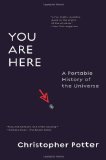Summary | Excerpt | Reviews | Beyond the Book | Read-Alikes | Genres & Themes | Author Bio

Critics' Opinion:
Readers' Opinion:
First Published:
Mar 2009, 304 pages
Paperback:
Feb 2010, 304 pages
 Book Reviewed by:
Book Reviewed by:
Kim Kovacs
Buy This Book
This article relates to You Are Here
 Nicolaus Copernicus was one of the first scientists to remove the Earth (and consequently, humanity) from the center of the universe, countering the theological teachings of his day. As such, his theories are referred to often in You Are Here. He is regarded as one of the central figures of the Scientific Revolution, and is sometimes referred to as the founder of modern astronomy.
Nicolaus Copernicus was one of the first scientists to remove the Earth (and consequently, humanity) from the center of the universe, countering the theological teachings of his day. As such, his theories are referred to often in You Are Here. He is regarded as one of the central figures of the Scientific Revolution, and is sometimes referred to as the founder of modern astronomy.
Copernicus was born Mikolaj Kopernik on February 19, 1473 in the Polish town
of Torun, the youngest of four children. His father was a wealthy copper trader
active in local politics (kopernik translates as "one who works with copper"), who died when Copernicus was still young. His maternal
uncle, Lucas Watzenrode, became guardian to Copernicus and his siblings.
The young Kopernik (who Latinized his name to Nicolaus Copernicus later in life) was very well educated. He first studied astronomy and astrology
at the University of Krakow (1491 – 1494). With the help and encouragement of
his uncle, he was elected a canon of the cathedral chapter of Frombork in 1496,
and subsequently attended the University of Bologna to study both civil and canon (canon law being the ecclesiastical laws that govern the Catholic Church) From 1501 to 1503 he studied medicine at the University of Padua, and
obtained a doctorate in canon law from the University of Ferrara in 1503. He
afterwards returned to Frombork to serve as medical advisor and secretary to his
uncle, later becoming heavily involved with administrative tasks in the diocese.
In 1514, Copernicus began circulating a six-page, handwritten text outlining
his heliocentric theories. This document, referred to as the Commentariolus
(Little Commentary), contained seven assumptions which served as the basis for
his future masterwork, De Revolutionibus Orbium Coelestium (On the
Revolutions of the Heavenly Spheres).
Copernicus became an increasingly well-known mathematician. In 1539, he was
visited by Georg Joachim Rheticus, a young professor of mathematics and
astronomy at the University of Wittenberg. He stayed for two years, learning
from Copernicus and absorbing his theories. Rheticus went on to publish
Narratio Prima (First Report on the Books of Revolution), which reported
Copernicus' heliocentric theory. Narratio Prima was favorably received,
and Rheticus persuaded Copernicus to publish a full account, which became De
Revolutionibus Orbium Coelestium in 1543. Copernicus died two months after
its publication from what is believed to have a stroke. He was entombed in
the Frombork Cathedral in northern Poland (remains discovered in 2005 were
confirmed
to belong to Copernicus in 2008).
Copernicus's theories profoundly altered later views of the universe, but
were rejected by the Catholic Church in favor of the geocentric schemes espoused
by Aristotle and Ptolemy. Interestingly, his works were largely ignored until
brought to the fore by Galileo, who was convicted of heresy in 1633 for
"following the position of Copernicus, which is contrary to the true sense and
authority of Holy Scripture."*
*Two centuries later, in 1757, Pope Benedict XIV suspended the ban on heliocentric works, fifteen years after two Catholic mathematicians published an annotated copy of Isaac Newton's Philosophiae Naturalis Principia Mathematica with a preface stating that the author's work assumed heliocentrism and could not be explained without the theory. A further sixty-five years would pass until Pope Pius VII approved a decree in 1822 to allow the printing of heliocentric books in Rome.
Filed under People, Eras & Events
![]() This "beyond the book article" relates to You Are Here. It originally ran in May 2009 and has been updated for the
February 2010 paperback edition.
Go to magazine.
This "beyond the book article" relates to You Are Here. It originally ran in May 2009 and has been updated for the
February 2010 paperback edition.
Go to magazine.





The Flower Sisters
by Michelle Collins Anderson
From the new Fannie Flagg of the Ozarks, a richly-woven story of family, forgiveness, and reinvention.

The House on Biscayne Bay
by Chanel Cleeton
As death stalks a gothic mansion in Miami, the lives of two women intertwine as the past and present collide.

The Funeral Cryer by Wenyan Lu
Debut novelist Wenyan Lu brings us this witty yet profound story about one woman's midlife reawakening in contemporary rural China.
Your guide toexceptional books
BookBrowse seeks out and recommends the best in contemporary fiction and nonfiction—books that not only engage and entertain but also deepen our understanding of ourselves and the world around us.